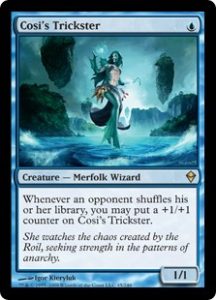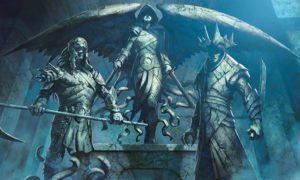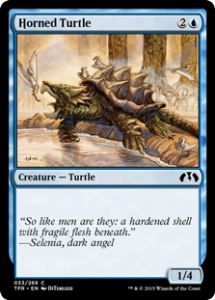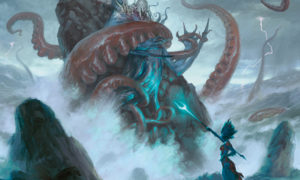“Other cultures did not tell children stories like this—about mocking tradition and defying the gods. But other cultures did not have Cosi.” – Uncharted Realms, Home Waters.
In this week’s Uncharted Realms, we get to follow the Green/Blue planeswalker Kiora back to Zendikar and her merfolk tribe. Made refugees by Ulamog, the Ceaseless Hunger and his Eldrazi brood, her people prepare to travel to Murasa and escape the notice of their onetime gods. Kiora, however, has another plan, and with a small troop of tricksters devoted to the merfolk deity Cosi (now Kozilek) sets out to defy the “gods” one last time – by fighting them to reclaim Sea Gate.
Trickster Gods and Heroes
Although Kiora herself is no worshiper of Cosi, her satirical reverence of the former divine figure Cosi helps to puncture the awe and fear of the Eldrazi, mocking what was once sacred and now monstrous. In this way, the merfolk deity (and Kiora herself) are reflections of religious practice here on Earth, as examples of a great many trickster gods, heroes, and myths throughout human belief and history.
This column already spoke of one of the foremost trickster gods in an earlier article about ravens. The Raven God of Pacific Northwest spiritual tradition was a curious and cunning deity, capable of immense creative power (as he formed life and light in the world), but also of whimsy and farcical antics.
The Raven God was not alone in his mirthful and chaotic depiction. All around the world, in stark contrast to the dour judges and omnipotent patriarchs of later monotheistic belief, trickster gods and supernatural forces pulled pranks on authorities both divine and mundane, mocking forces otherwise above insult. In diverse cultures from Ireland to Nigeria, in Japan, China, the Yucatan and the American Southwest, tricksters shared space with divine beings and animist spirits in the pantheon of the gods.
Take Ajapa, for example, a spiritual figure of the Yoruba people in Benin and Nigeria who traveled with his people’s stories to Brazil and Cuba during the horrors of the trans-Atlantic slave trade. Like Cosi/Kozilek, Ajapa went by many names depending upon the people and tribe who told his tales. The only universal trait he had was his depiction as a turtle and his reputation as an incorrigible trickster. Whether catching the elusive Colobus monkey, or fooling a trumpeting elephant who would be king, or leading astray human hunters, Ajapa was a master of misdirection and deception when it suited his interests. 1
In one tale, Ajapa’s trickery was the salvation of his people. Faced with the unreasonable demands of a tyrannical lion ruler, Ajapa volunteered to take the bully tribute and promised to humble him. When he arrived before the lion Kiniun, his slow gait and inelegant form so enraged the tyrant that he assumed the others made light of his threats. Ajapa informed him that by the river an even greater lion lay in wait, having plundered the animals of their tribute and denied Kiniun’s authority. Mocked and robbed, the lion came to the river, where he leapt upon his fearsome foe: his own reflection in the river’s surface. He met his death drowning in the rapid current, a victim of his own hubris.
Ajapa, however, was not motivated by high-minded heroism. His depictions across stories show him as greedy and deceitful, unwilling to share and frankly quick to take offense. Like Cosi, Ajapa’s legend invited few close adherents and earned criticism from Yoruba storytellers, who called him “Master of Many Lies.” But nevertheless, he appears in countless stories of the Yoruba people.
Tricksters as Saviors
The tortoise Ajapa makes for an unlikely savior. So too do all the other gods and mythological heroes of trickery – Coyote in the American Southwest, Hermes and Pan in Greek mythology, the Mayan “hero twins” or the English Robin Hood. But where Zeus and the other chief gods failed, sometimes only the trickster could prevail, substituting guile for power where power alone would not suffice.
Trickster tales gave hope, because they showed the weakest of figures could overcome the strongest against all odds.
The appeal of a trickster, whether god or mortal hero, lay not in their absolute power or wisdom, but in their close resemblance to ordinary people. Without Zeus’ thunderbolts or the lion’s claws, the tricksters of historical mythology appealed to diverse cultures around the world for their victory from below, their cunning in the face of power. Trickster tales, like those told of Ajapa amongst the Yoruba and Cosi amongst Kiora’s tribe, gave hope, because they showed the weakest and most human of figures could overcome the strongest against all odds. In such a story, a tortoise could defeat a lion.
Kiora is an unlikely hero for her people, but her stories told in Uncharted Realms are much like those of her onetime god Cosi and trickster gods and heroes throughout history. Hardly heroic, but rather self-centered and cunning, and not nearly a match for the raw power of a god, Kiora has already overcome one on Theros and is poised to face another at Sea Gate. Against impossible odds like those faced in the battle for Zendikar, trickster stories and legends like Cosi’s bring the promise of salvation where no other god or legend could, because only a trickster like Kiora could hope to prevail.
Join me next week as the Battle for Zendikar continues!
Curtis is bad Legacy player and lapsed historian in Worcester, Massachusetts.
1 These stories can be found in Oywkan Owomeyela, Yoruba Trickster Tales (Lincoln: University of Nebraska Press, 1997).





